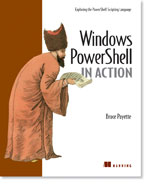/\/\o\/\/ PowerShelled
This blog has moved to http://ThePowerShellGuy.com Greetings /\/\o\/\/ $AtomFeed = ("Atom.xml")$PreviousItems = (" PowerShell : How can I tell whitch numbers are mis... "," PowerShell Active Directory Browser teaser "," Powershell, Has my Dell a dangerous battery Part 2 ? "," PowerShell, Has my Dell a dangerous battery ? "," PowerShell Adding -verbose switch to functions "," PowerShell and Active Directory Part 9 (nested gro... "," Powershell and hey Scripting guy ! "," PowerShell Orphan share remover Tool (Update) "," PowerShell and Active Directory Part 8 (ACL's) "," Signing PowerShell Scripts "," ")
Saturday, September 02, 2006
PowerShell : Can you do that less cryptic ?
Ok,Oh, all right
the onliner from last post (" PowerShell : How can I tell witch numbers are missing from a sequence of numbers found in a text file ? ,
gc test.txt | sort {[int]$_} |% {$i = 1}{while ($i -lt $_){$i;$i++};$i++}
was maybe a bit to tiny to post without any explanation.
you can do very powerfull things on the commandline like this, but for in a script or example this might not very handy.
I still not going to explain it,
but I will make it a lot more Clear what Happens, by showing that you do not have too be so tiny in PowerShell , you can write this in a more verbose and readable way , as the former one-liner Can also be written as Follows :
$numbers = get-content test.txt
# Sort the Numbers
$Sortednumbers = $Numbers | Sort {[int]$_}
# start comparing numbers in file to counter
$counter = 1
foreach ($number in $Sortednumbers ) {
# as long as Number in file is higher than counter, output as missing and raise counter
while ($counter -lt $Number){
"$Counter is missing"
$Counter++
}
# counter is the same as Number, hence is in file output and raise counter
"$Counter is In file"
$Counter++
}
This code does exactly the same as the on-liner, is a bit more work, but much more clear for code you or somebody else might have to read or change.
*Edit* some other suggestions given on IRC for handling this question are :
# <dreeschkind>
$n = gc test.txt
$n|%{[int]$max = 1}{if ($max -lt $_){$max=$_}}
diff -r $(1..$max) $n
# <mow001> slower
$n = gc test.txt
$max = ($n | Measure-Object -max).maximum
diff -r $(1..$max) $n
# <d2d> faster ?
$result = @(); $arr = Get-Content test.txt; for ($i = 1; $i -lt $arr[-1]; $i++) { if ($arr -notcontains $i) { $result += $i } }; $result
*Edit 2* Another tip : Need for speed, use another cool feature from Powershell go .NET directly :
[int[]]$a=[io.file]::ReadAllLines('c:\powershell\test.txt')
[array]::sort($a)
Enjoy,
Greetings, /\/\o\/\/
Tags : Monad msh PowerShell
